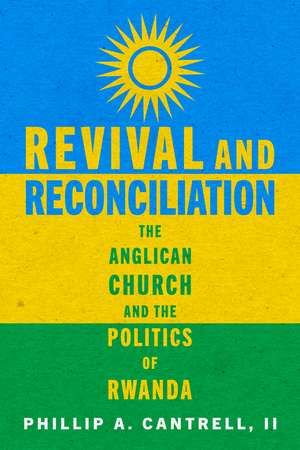Revival and Reconciliation: The Anglican Church and the Politics of Rwanda
Autor Phillip A. Cantrell, IIen Limba Engleză Hardback – 18 ian 2022
Drawing from new archival materials as well as on-the-ground field research, Revival and Reconciliation is a Rwanda-centered account of the country's ecclesiastical and national historiography. Cantrell calls attention to the harms the postgenocide church risks doing should it continue to support false narratives about Rwanda's colonial and postcolonial past—with dangerous consequences for the future.
Preț: 473.13 lei
Preț vechi: 614.45 lei
-23% Nou
Puncte Express: 710
Preț estimativ în valută:
90.54€ • 98.32$ • 76.06£
90.54€ • 98.32$ • 76.06£
Carte tipărită la comandă
Livrare economică 23 aprilie-07 mai
Preluare comenzi: 021 569.72.76
Specificații
ISBN-13: 9780299335106
ISBN-10: 0299335100
Pagini: 248
Dimensiuni: 152 x 229 x 18 mm
Greutate: 0.45 kg
Ediția:First Edition
Editura: University of Wisconsin Press
Colecția University of Wisconsin Press
ISBN-10: 0299335100
Pagini: 248
Dimensiuni: 152 x 229 x 18 mm
Greutate: 0.45 kg
Ediția:First Edition
Editura: University of Wisconsin Press
Colecția University of Wisconsin Press
Recenzii
"This refreshingly honest account offers compelling perspectives on colonial mentalities, missionary schisms, and church-state relations in Africa. As an essential history of the Anglican Church in Rwanda, it will certainly find its way to many scholars' bookshelves. Written in graceful prose, it may also become a staple for course readings."—David Newbury, Smith College
"A sweeping history of the Rwandan Anglican Church. . . . Sure to be controversial, Revival and Reconciliation is grounded in solid original research that makes it a must-read for people interested in Rwanda, church history, religion, and violence."—Timothy Longman, author of Christianity and Genocide in Rwanda
"Essential reading for anyone who is working to understand the dynamics of colonialism, postcolonialism, religion, and globalization in their impact on international Anglican life."—Richard Mammana, Medium
“Required reading for anyone interested in Rwanda or in church-state relations in Africa more broadly. . . . Essential.”—CHOICE Reviews
"A sweeping history of the Rwandan Anglican Church. . . . Sure to be controversial, Revival and Reconciliation is grounded in solid original research that makes it a must-read for people interested in Rwanda, church history, religion, and violence."—Timothy Longman, author of Christianity and Genocide in Rwanda
"Essential reading for anyone who is working to understand the dynamics of colonialism, postcolonialism, religion, and globalization in their impact on international Anglican life."—Richard Mammana, Medium
“Required reading for anyone interested in Rwanda or in church-state relations in Africa more broadly. . . . Essential.”—CHOICE Reviews
Notă biografică
Phillip A. Cantrell II is an associate professor of world and African history at Longwood University. His main research area is East Central Africa during the colonial period.
Cuprins
Contents
Preface
Introduction
1 False Narratives of a Disputed Past: Precolonial Rwanda
2 History Intervenes: Colonialism, Christianity, and the Ruanda Mission
3 Growth, Revival, and Conflict: The Anglican Church through World War II
4 The Unravelling: The Ruanda Mission and Independence
5 Revival and Reconciliation: The Anglican Church in Post-genocide Rwanda
Conclusions: History Faces the Present
Notes
Bibliography
Index
Preface
Introduction
1 False Narratives of a Disputed Past: Precolonial Rwanda
2 History Intervenes: Colonialism, Christianity, and the Ruanda Mission
3 Growth, Revival, and Conflict: The Anglican Church through World War II
4 The Unravelling: The Ruanda Mission and Independence
5 Revival and Reconciliation: The Anglican Church in Post-genocide Rwanda
Conclusions: History Faces the Present
Notes
Bibliography
Index
Descriere
Phillip A. Cantrell II takes a critical look at the Anglican Church's crucial role in many aspects of Rwanda's history, particularly its complicity with the current Rwandan regime. He boldly illuminates the Anglican Church's culpability in the events leading to the genocide, calling attention to the consequences of the church's unwavering support for the Rwandan regime.
